...rediscovering
an ancient window on the
sky...
By
John Townley, November 2012
Back
in the 1980s when I was developing maritime
music and culture programs
and exhibits for The Mariners' Museum,
my mentor,
sometime performing partner, family
friend, and
ancient mariner Stan
Hugill
told me about a special stone that the Vikings used
to guide their ships before the compass came to Europe from China. By
looking
through it,
they could tell where the Sun was, even behind a cloud bank or below
the
horizon, and they used it to navigate their course to Iceland,
Greenland,
and
ultimately America (Vinland, as they called it). It was widely
thought to be
a seaman’s myth, but Stan claimed he had actually seen one,
embedded in the
capstone of the entrance to the seaman’s church in his town
of Aberdovey,
Wales. It seemed a wonderful story, and that was about all, at the
time,
nothing possible to pursue. We were both too busy touring, recording,
and taking
advantage
of the momentary revival of sea songs on both sides of the Atlantic, of
which
Stan was the acclaimed doyen, being compiler of the most definitive
collections of traditional maritime music and the last real shantyman
to have actually sung
aboard
working sail in the 1920s..
But
for the sailor, the sea and its
lore never dies, and
though Stan passed in 1992 and later the shanty revival did, too, the
fascination with the life at sea and its mysteries remained. And, over
the
years, I had also become increasingly interested in talismans and
symbolic
pendants – a topic familiar to many fellow astrologers and
followers of the
generally ineffable. So in that double vein, wife Susan and I were
shopping with a
friend in November of last year, and as we poked around
a local
jewelry store looking for something new, it occurred to me that the
ultimate
sailor’s talisman/pendant would be a legendary Viking Sun
stone! Of course, why
not? Why hadn’t I thought of it before, and why was I
thinking of it now? And, of course, where would I find one?
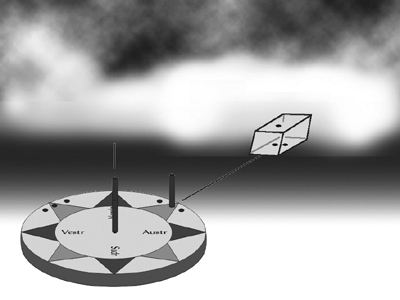
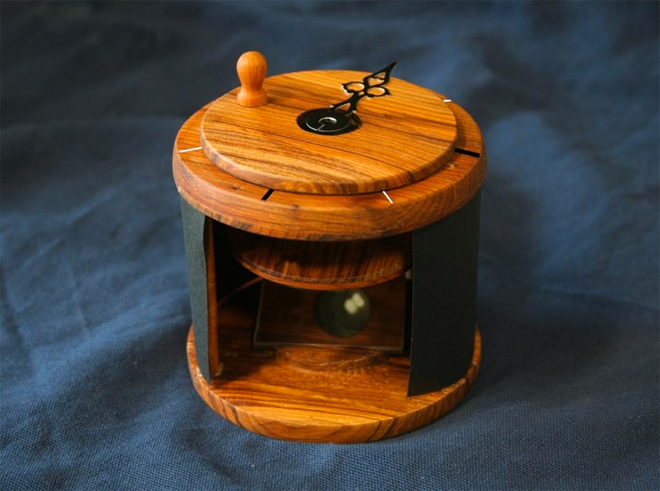
Vikings
found the Sun
behind clouds by matching double images from crystal (l.), researchers
created a modern version (r.)
A
quick Google search uncovered the answers. It turned out
that only the week before two French researchers had published a paper
of their research
that revealed the Viking Sun stone (actually, a crystal of transparent
Iceland
spar, or optical calcite), was probably used exactly as the
“myth”
(which included actual Norse
manuscripts)
depicted, and they had experiments and
archaeological evidence to back it up. I guess I must have picked it up
from
the atmosphere. So my next Google was to find a Sun stone pendant for
myself, a
perfect talisman for the astrological mariner. Surely there were some
out there
somewhere to be had.
But
really, there weren’t. After exhaustive searching, I
found only two – one a rather unattractive, squarish thing,
unprepossessingly
wrapped in a silver coil, and the other a tiny diamond-shaped charmer,
artistically wrapped in brass, so I ordered the latter from the pendant-maker
on eBay.
It shone like a star, especially worn on
a black turtleneck, and, more important, it seemed to have palpable (if
only
symbolic) compass power. It made me feel like I knew where I was going
(even if,
perhaps, I didn’t), spearheaded by this miniature headlight
leading me on, hovering
in front of my heart chakra.
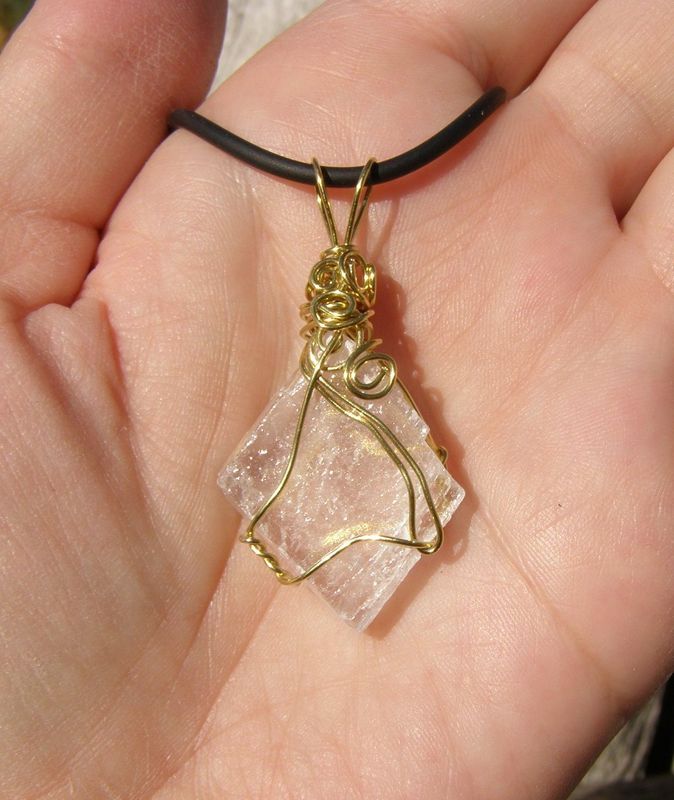
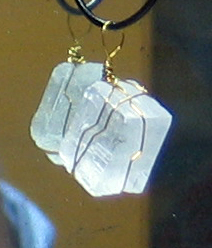
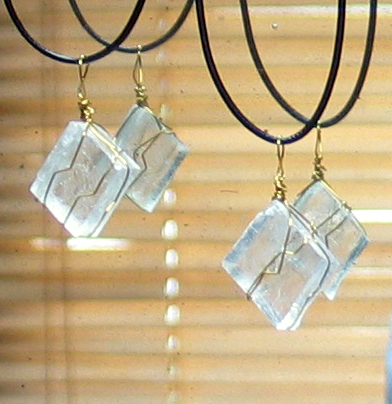
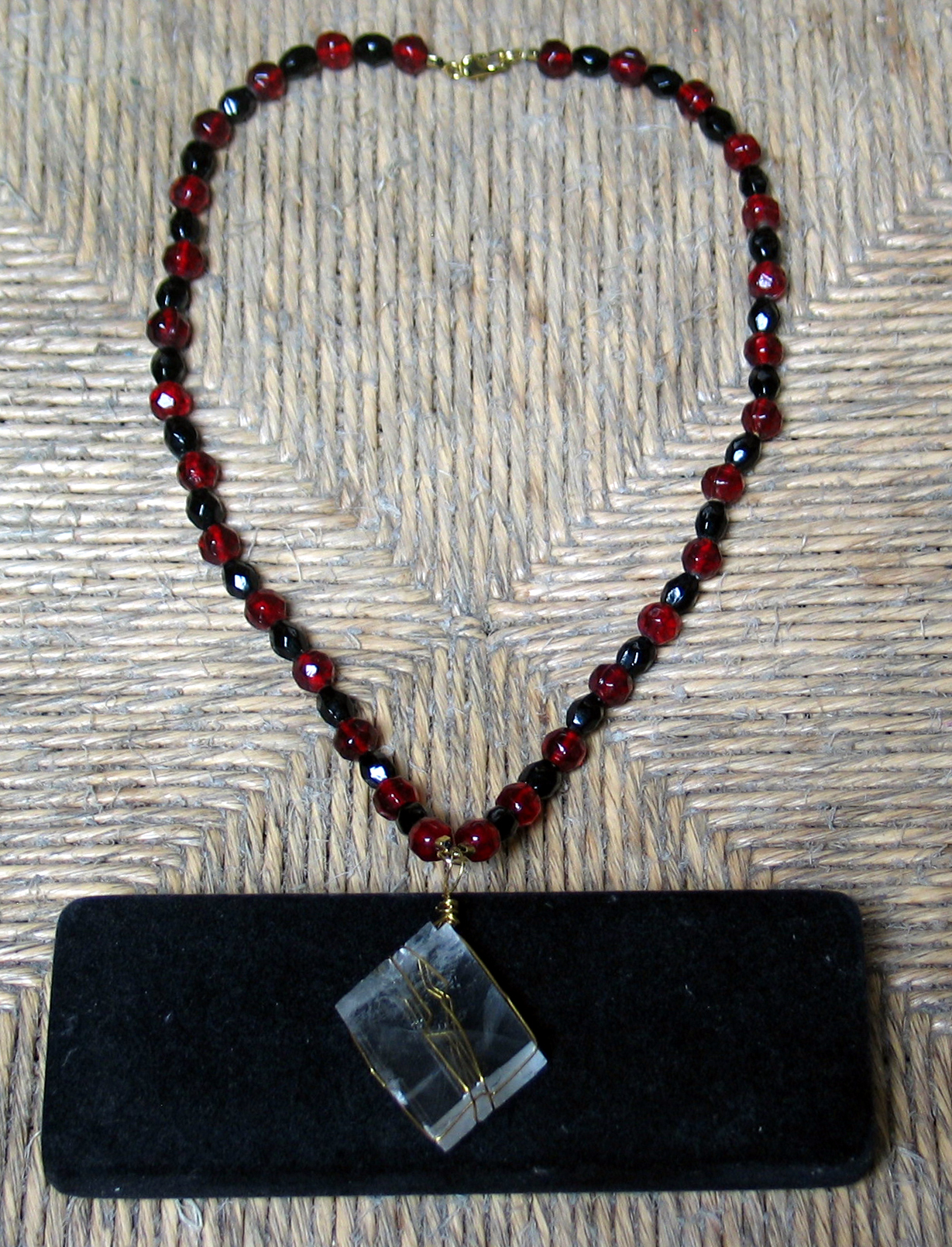
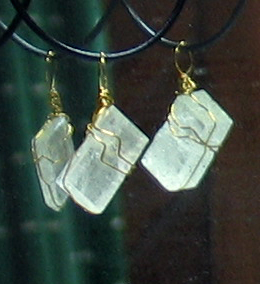
Only one, tiny
pendant could be found (far l.) so
more have been prepared to fill the gap, supply an eager audience.
Want one? You can buy
them here...
I
won’t go into that part too much further, not being one to
hype the spiritual power of precious stones (although, I admit,
Kunz’s 1913 Curious Lore of Precious Stones
is
the only book I borrowed from the library as a teenager that somehow
never made
it back), but suffice to say that I was, and am, really impressed by
how it
feels to wear this legendary rock.
And,
since this marvelous talisman for guidance was simply
not available, I reckoned it was up to me to correct the situation.
After six
months of seeking out raw stones (now more available than in Viking
times) and
learning to neatly fracture the ungainly larger specimens into
sharp-edged,
wearing-size, rhombus-shaped crystals – and then devising a
brass-wire wrap
that would safely enclose and display them – it was off to
the races. The
“races” were a series of lectures in
Houston,
at the height of the
100+ degree burning summer heat, where to my
delighted surprise, everyone wanted one. By the last lecture, the
audience
featured a flock of “sisters of the Sun stone” who
were feeling rather the same
way about it I was – totally entranced. And when not actually
being worn, these
newly-acquired stones quickly found their way to use as divining
pendulums, a
logical next development.
So
here they are, in varying sizes and proportions of the
always-rhombus shaped, diamond-like crystal. The angles are always 103
degrees
(a biseptile) and 77 degrees (half a triseptile), making the
astrological
symbolism one of the number seven, universalism, the big picture, the
whole
enchilada. Perhaps, with my Sun-Moon exactly biseptile,
that’s part of their
special appeal to me, or perhaps because of the symbolism itself,
it’s just
universal.
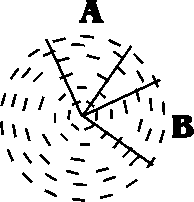
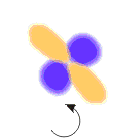
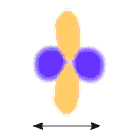

Haidinger's Brush:
Polarized light falling
on sectors of the eye (l) activates pigment images that point
toward its source
How
does it actually work, as a compass? Both physically, as a unique depolarizer of light, and biologically, as it
trips an ocular after-image which makes its guidance doubly accurate.
When
looking through the Sun stone, the wire wrapping (or any object on the
other
side) has a double image, a unique quality of this light-splitting
crystal.
Move it around, and when the two images are of equal intensity, it is
pointing
toward the Sun. And an inner
“Haidinger’s
Brush”
eye image (which may take some work to locate, see the link) then makes
it even
more
exact.
As
for more magical, precious stone lore, Icelandic spar is
replete with its own set of properties. These particularly include, not
surprisingly, focus and clarity of thinking, grounding and centering
– good for
students and those on any learning path. It is also considered
excellent for
distance healing and for absorbing surrounding hostility and discord,
hence a
stone that enhances reconciliation and peace.
It is said to cleanse and realign the chakras, and particular shades of
it may
especially favor one or another of these centers. At a higher level,
this is
very like what the Vikings used it for: clarifying your status and
finding your
way.
Anyhow,
what was once a Norse legend and a mariner’s myth is
now a tangible talisman you can hold in your hand, and let it guide you
as it
did the Vikings, as it catch the light and its glint flashes with the
hidden
inner and outer sunlight. Regardless of how you view
the purported power of precious stones, it is a constant personal
reminder and
historical inspiration: if the Vikings could make it all the way to
America
with only this to aid their native seamanship, then you can certainly
navigate
your own path in this day and age, wherever it leads.
[If
you'd like a stone of your own,
for the moment we are making available a limited selection I have
personally hand-wrapped, with adjustable neck cords here. It's a labor of love, so
it won't last
forever...!]
Informative
links about the history of and ongoing research into the Viking
Sunstone:
Discovery magazine
article
Haidinger’s
Brush
ocular
phenomenon
Science
magazine wrap
Film on how to match the
image
NASA
film on Viking navigation
Wired magazine
article
Good explanation of
the
crystal’s properties
Secrets
of the Viking Navigators,
article and book
Get Your
Own Viking Sun Stone Pendant

